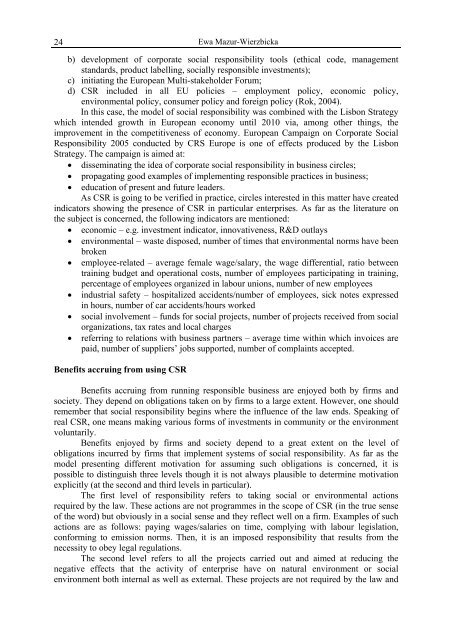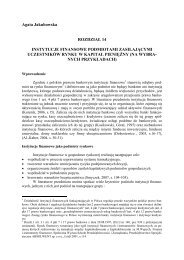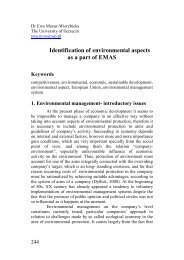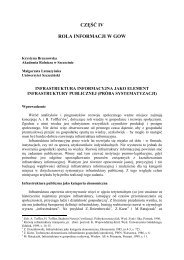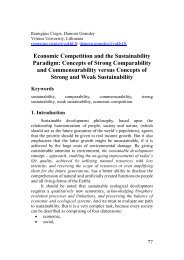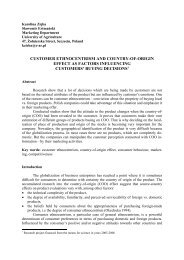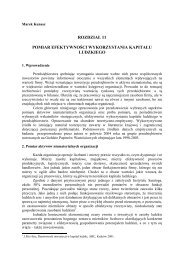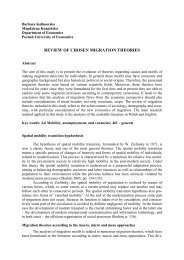corporate social responsibility as a valuable contribution to ...
corporate social responsibility as a valuable contribution to ...
corporate social responsibility as a valuable contribution to ...
Create successful ePaper yourself
Turn your PDF publications into a flip-book with our unique Google optimized e-Paper software.
24 Ewa Mazur-Wierzbicka<br />
b) development of <strong>corporate</strong> <strong>social</strong> <strong>responsibility</strong> <strong>to</strong>ols (ethical code, management<br />
standards, product labelling, <strong>social</strong>ly responsible investments);<br />
c) initiating the European Multi-stakeholder Forum;<br />
d) CSR included in all EU policies – employment policy, economic policy,<br />
environmental policy, consumer policy and foreign policy (Rok, 2004).<br />
In this c<strong>as</strong>e, the model of <strong>social</strong> <strong>responsibility</strong> w<strong>as</strong> combined with the Lisbon Strategy<br />
which intended growth in European economy until 2010 via, among other things, the<br />
improvement in the competitiveness of economy. European Campaign on Corporate Social<br />
Responsibility 2005 conducted by CRS Europe is one of effects produced by the Lisbon<br />
Strategy. The campaign is aimed at:<br />
• disseminating the idea of <strong>corporate</strong> <strong>social</strong> <strong>responsibility</strong> in business circles;<br />
• propagating good examples of implementing responsible practices in business;<br />
• education of present and future leaders.<br />
As CSR is going <strong>to</strong> be verified in practice, circles interested in this matter have created<br />
indica<strong>to</strong>rs showing the presence of CSR in particular enterprises. As far <strong>as</strong> the literature on<br />
the subject is concerned, the following indica<strong>to</strong>rs are mentioned:<br />
• economic – e.g. investment indica<strong>to</strong>r, innovativeness, R&D outlays<br />
• environmental – w<strong>as</strong>te disposed, number of times that environmental norms have been<br />
broken<br />
• employee-related – average female wage/salary, the wage differential, ratio between<br />
training budget and operational costs, number of employees participating in training,<br />
percentage of employees organized in labour unions, number of new employees<br />
• industrial safety – hospitalized accidents/number of employees, sick notes expressed<br />
in hours, number of car accidents/hours worked<br />
• <strong>social</strong> involvement – funds for <strong>social</strong> projects, number of projects received from <strong>social</strong><br />
organizations, tax rates and local charges<br />
• referring <strong>to</strong> relations with business partners – average time within which invoices are<br />
paid, number of suppliers’ jobs supported, number of complaints accepted.<br />
Benefits accruing from using CSR<br />
Benefits accruing from running responsible business are enjoyed both by firms and<br />
society. They depend on obligations taken on by firms <strong>to</strong> a large extent. However, one should<br />
remember that <strong>social</strong> <strong>responsibility</strong> begins where the influence of the law ends. Speaking of<br />
real CSR, one means making various forms of investments in community or the environment<br />
voluntarily.<br />
Benefits enjoyed by firms and society depend <strong>to</strong> a great extent on the level of<br />
obligations incurred by firms that implement systems of <strong>social</strong> <strong>responsibility</strong>. As far <strong>as</strong> the<br />
model presenting different motivation for <strong>as</strong>suming such obligations is concerned, it is<br />
possible <strong>to</strong> distinguish three levels though it is not always plausible <strong>to</strong> determine motivation<br />
explicitly (at the second and third levels in particular).<br />
The first level of <strong>responsibility</strong> refers <strong>to</strong> taking <strong>social</strong> or environmental actions<br />
required by the law. These actions are not programmes in the scope of CSR (in the true sense<br />
of the word) but obviously in a <strong>social</strong> sense and they reflect well on a firm. Examples of such<br />
actions are <strong>as</strong> follows: paying wages/salaries on time, complying with labour legislation,<br />
conforming <strong>to</strong> emission norms. Then, it is an imposed <strong>responsibility</strong> that results from the<br />
necessity <strong>to</strong> obey legal regulations.<br />
The second level refers <strong>to</strong> all the projects carried out and aimed at reducing the<br />
negative effects that the activity of enterprise have on natural environment or <strong>social</strong><br />
environment both internal <strong>as</strong> well <strong>as</strong> external. These projects are not required by the law and


